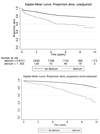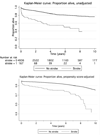Delirium after coronary artery bypass graft surgery and late mortality
- PMID: 20373345
- PMCID: PMC3723404
- DOI: 10.1002/ana.21899
Delirium after coronary artery bypass graft surgery and late mortality
Abstract
Objective: Delirium is common after cardiac surgery, although under-recognized, and its long-term consequences are likely underestimated. The primary goal of this study was to determine whether patients with delirium after coronary artery bypass graft (CABG) surgery have higher long-term out-of-hospital mortality when compared with CABG patients without delirium.
Methods: We studied 5,034 consecutive patients undergoing CABG surgery at a single institution from 1997 to 2007. Presence or absence of neurologic complications, including delirium, was assessed prospectively. Survival analysis was performed to determine the role of delirium in the hazard of death, including a propensity score to adjust for potential confounders. These analyses were repeated to determine the association between postoperative stroke and long-term mortality.
Results: Individuals with delirium had an increased hazard of death (adjusted hazard ratio [HR], 1.65; 95% confidence interval [CI], 1.38-1.97) up to 10 years postoperatively, after adjustment for perioperative and vascular risk factors. Patients with postoperative stroke had a HR of 2.34 (95% CI, 1.87-2.92). The effect of delirium on subsequent mortality was the strongest among those without a prior stroke (HR 1.83 vs HR 1.11 [with a prior stroke] [p-interaction = 0.02]) or who were younger (HR 2.42 [<65 years old] vs HR 1.49 [>/=65 years old] [p-interaction = 0.04]).
Interpretation: Delirium after cardiac surgery is a strong independent predictor of mortality up to 10 years postoperatively, especially in younger individuals and in those without prior stroke. Future studies are needed to determine the impact of delirium prevention and/or treatment in long-term patient mortality.
Figures


References
-
- Inouye SK. Delirium in older persons. N. Engl. J. Med. 2006;354:1157–1165. - PubMed
-
- Ely EW, Siegel MD, Inouye SK. Delirium in the intensive care unit: An underrecognized syndrome of organ dysfunction. Seminars in Respiratory and Critical Care Medicine. 2001;22:115–126. - PubMed
-
- Tan MC, Felde A, Kuskowski M, et al. Incidence and predictors of postcardiotomy delirium. Am. J. Geriatr. Psychiatry. 2008;16:575–583. - PubMed
-
- van der Mast RC, Roest FHJ. Delirium after cardiac surgery: A critical review. J. Psychosom. Res. 1996;41:13–30. - PubMed
Publication types
MeSH terms
Grants and funding
LinkOut - more resources
Full Text Sources
Other Literature Sources
Medical

